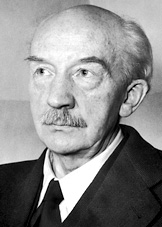- Walther Wilhelm Georg Bothe
-
Walther Bothe
 Walther Bothe
Walther Bothe
Walther Wilhelm Georg Bothe, né à Oranienburg le 8 janvier 1891 et mort à Heidelberg le 8 février 1957, était un physicien, mathématicien et chimiste allemand. Il apporta des contributions fondamentales à la physique nucléaire moderne et fut lauréat du prix Nobel de physique en 1954 avec Max Born pour ses travaux en mécanique statistique sur la méthode des coïncidences.
Sommaire
Biographie
Enfance et jeunesse : de 1891 à 1920
Bothe naît à Oranienburg, de Friedrich Bothe, maître horloger, et Charlotte Bothe née Hartung, son épouse, couturière. Il passe son enfance et la majeure partie de sa jeunesse dans sa ville natale. Né au 2, Berliner Straße, il déménage en 1892 au 7, Bernauer Straße. Les deux maisons furent entièrement détruites lors des bombardements de la seconde guerre mondiale. Il se distingue alors par un esprit aiguisé et logique, une volonté inflexible et un don pour la musique et la peinture.
Il passe son baccalauréat en 1908 à Berlin, puis y étudie la physique, les mathématiques, la chimie et la musique à l'université jusqu'en 1913. Il finance ses études par des cours privés et des travaux occasionnels pour compléter ses bourses.
Après avoir passé son Lehramtsprüfung (examen d'enseignant) en 1913, il travaille un temps comme assistant à la Landwirtschaftliche Hochschule (école supérieure d'agriculture) de Berlin. Mais il est vite engagé au laboratoire sur la radioactivité du Physikalisch-Technische Reichsanstalt, créé un an plus tôt par Hans Geiger. Élève de Max Planck, il soutient en 1914 sa thèse de doctorat : Au sujet de la théorie moléculaire de la réfraction, réflexion, dispersion et extinction
Au cours de la première guerre mondiale, Bothe est fait prisonnier de guerre par les Russes. Durant sa captivité, il développe avec des moyens de fortune des fabriques d'allumettes et de soude. Il contribue en outre à plusieurs problèmes de mathématiques et se consacre à l'apprentissage du russe.
Le 8 juillet 1920, à Moscou, il épouse Barbara (Warwara) Belowa. Il l'avait rencontrée à Berlin avant la guerre et correspondait régulièrement avec elle. De ce mariage ils auront deux filles. Il retourne en Allemagne en 1920.
Publications
- (avec Hans Geiger), Experimentaler Teil, 1921
- Bemerkung zur vorstehenden Arbeit, 1921
- Remarks on the Leipziger DÒ attempt, 1941
- The distribution of velocity of the neutrons in a braking means, 1942
- The vermehrung of fast neutrons in uranium and some other work from the KWI Heidelberg
- Over radiation protection walls
- (avec W. Fünfer), Layer attempts with variation of the u and DÒ thicknesses
Liens externes
- (en) Lauréats du prix Nobel de physique 1954
- (en) Notice biographique sur le site de la fondation Nobel
Précédé de :
Frederik ZernikePrix Nobel de physique
1954Suivi de :
Polykarp Kusch , Willis E. Lamb- Portail de la physique
Catégories : Naissance en 1891 | Décès en 1957 | Physicien allemand | Chimiste allemand | Mathématicien allemand | Lauréat du Prix Nobel de physique
Wikimedia Foundation. 2010.
